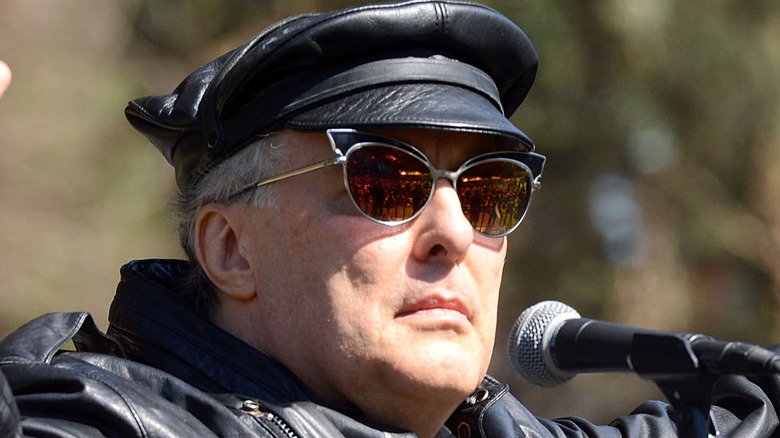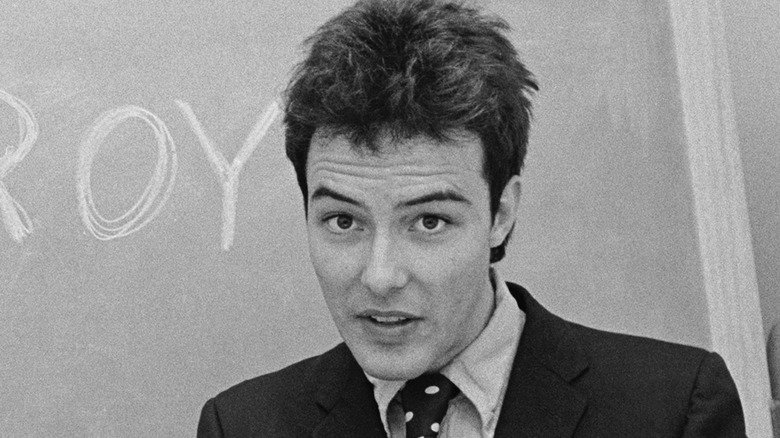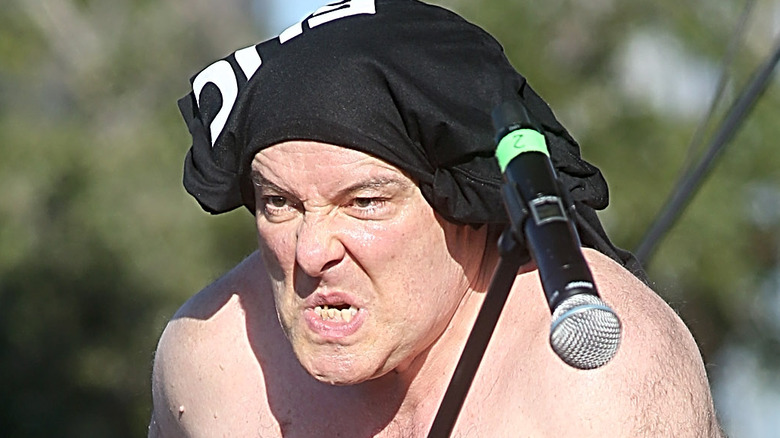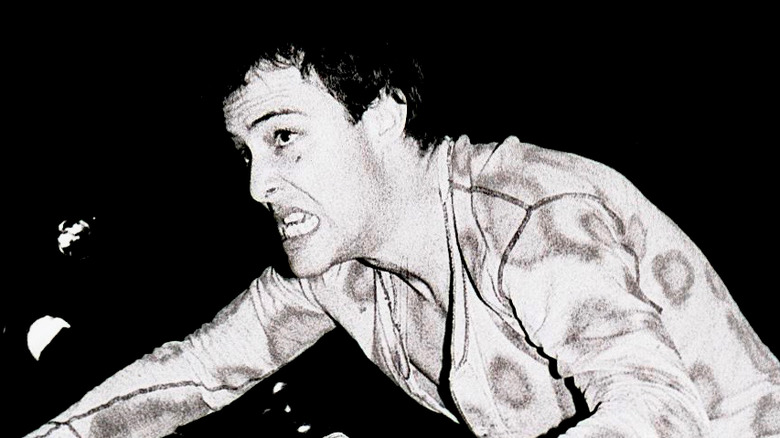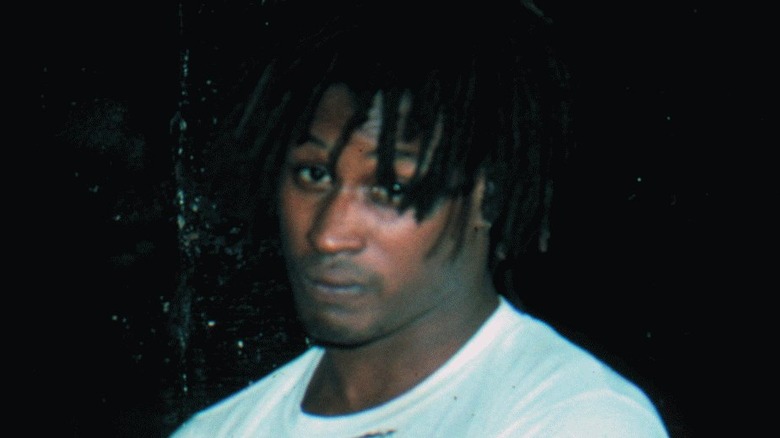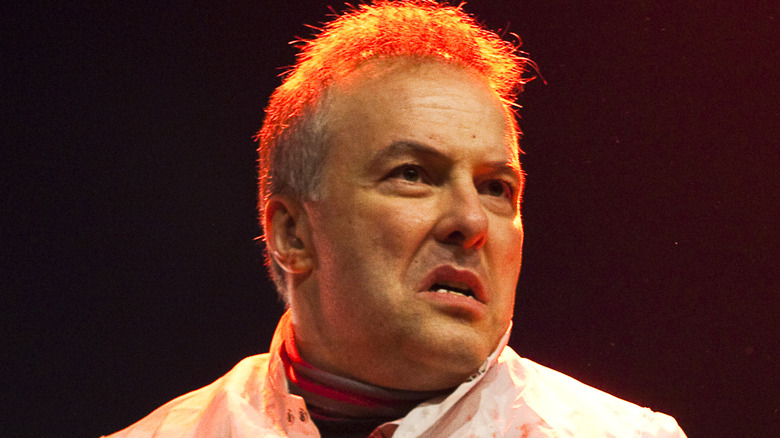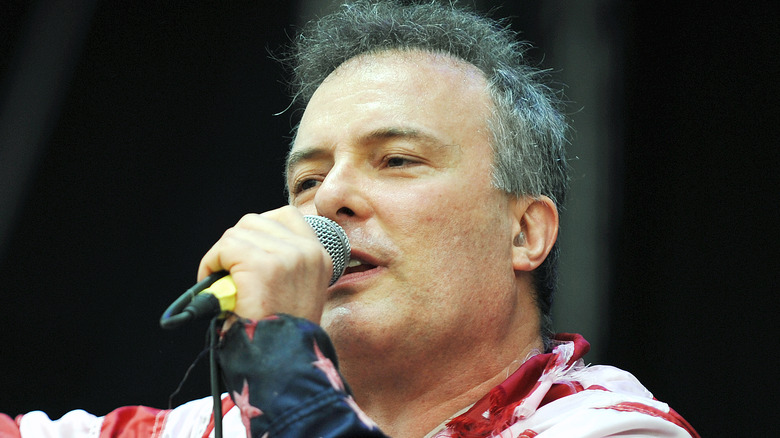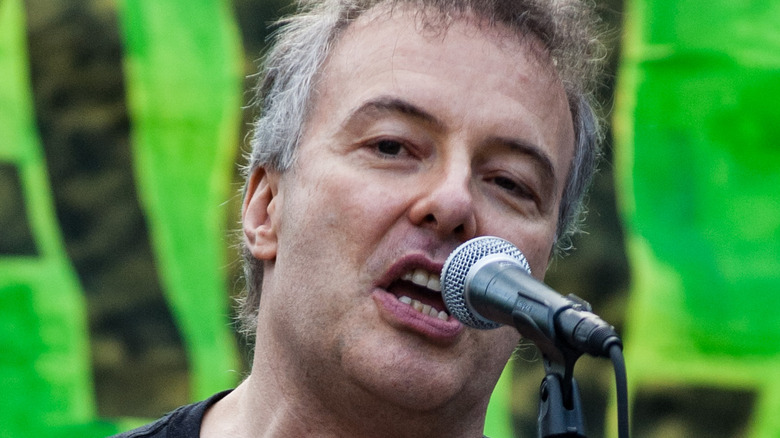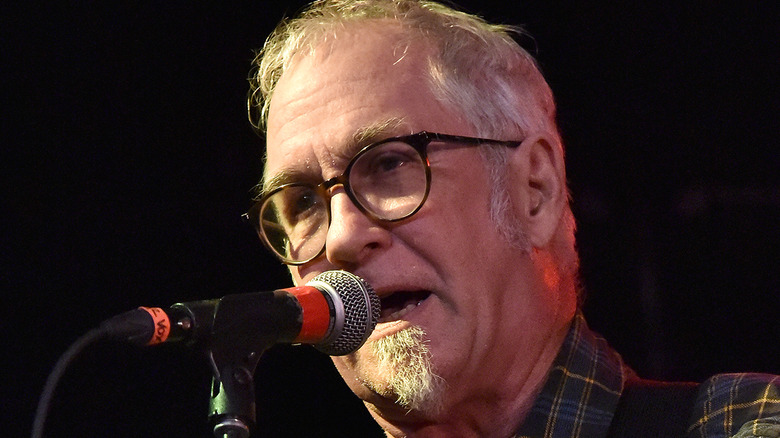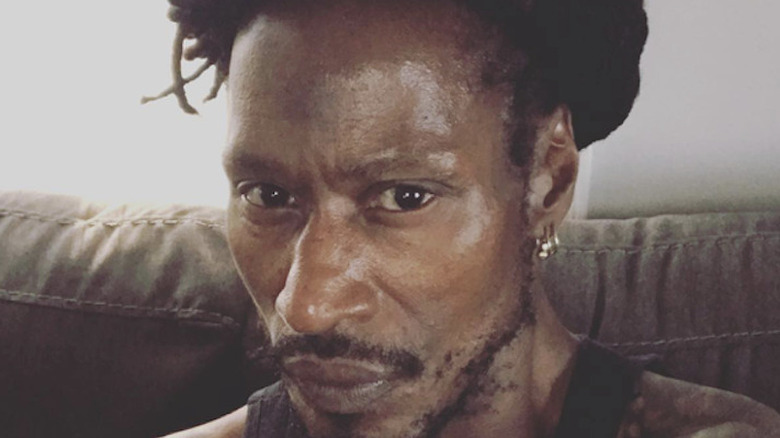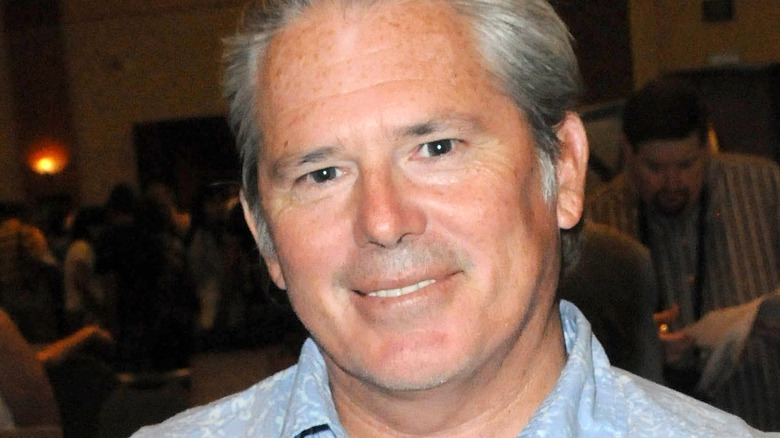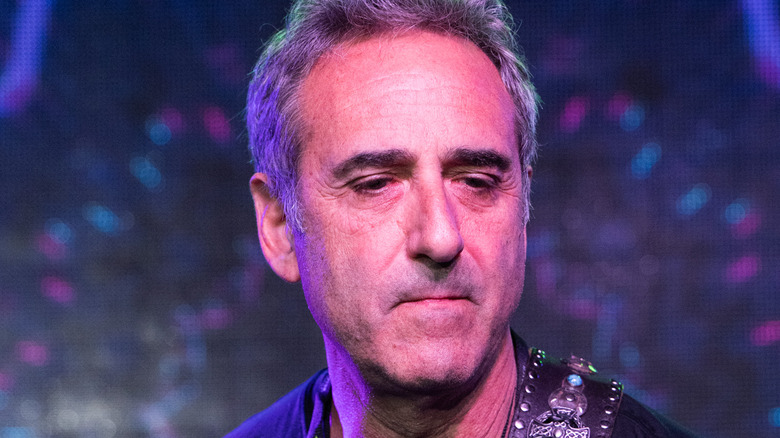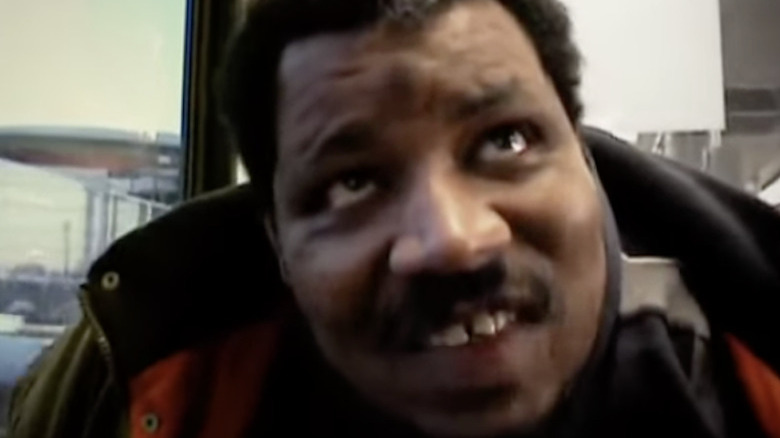Tragic Details About The Dead Kennedys
Punk rock — a lifestyle, philosophy, and look as much as it was a form of stripped-down guitar-forward rock n' roll, played as fast, as loud, and as aggressively as possible — made a huge and challenging impact in the late 1970s, in the United Kingdom with politically charged bands like the Clash and the Sex Pistols, and in the United States via snotty and independent New York bands such as the Ramones.
The next wave of punk came out of California, and it was messy, chaotic, and extremely critical of the powers that be — and these traits of the new movement came in large part from the Dead Kennedys. Gleeful provocateurs, the band's edginess expanded well beyond its blunt name as they courted controversy with now classic, often confrontational punk songs like "California Uber Alles," "Holiday in Cambodia," and "Too Drunk to F***.
The Dead Kennedys have frequently broken up, reformed, and regrouped over the past four decades, dealing with a lot of infighting, legal troubles, death, destruction, betrayal, and pain that even the best punk bands could only hint at in their music. Here are the worst things to ever happen to the Dead Kennedys and its members.
The Dead Kennedys were banned in Britain
Perhaps it's innately un-punk for a punk band to land a single on the Top 40 pop chart, but it certainly provides fuel for the raging against the machine endemic to the genre when governmental and corporate bodies align to prevent such a thing from happening. The Dead Kennedys never made the Billboard Hot 100 tally and reached the lower rungs of the official U.K. Charts' singles listings four times in the early 1980s. Their brand of punk rock isn't the most traditionally commercial or radio-friendly, but they could've spread their message (and made a lot more money) if the progress of their 1981 single "Too Drunk to F***" hadn't been stymied.
Because of the title and content, the government-controlled BBC Radio 1 banned the song from its airwaves, according to Index on Censorship. Despite that, "Too Drunk to F***" reached No. 36 on the U.K. charts, and in counting down the Top 40, DJ Tony Blackburn wouldn't even refer to it by any part of its title, censored or otherwise. The Dead Kennedys authorized a consumer-directed sticker to go on copies stocked by squeamish stores that read, according to Discogs, "Caution: You are the victim of yet another stodgy retailer afraid to warp your mind by revealing the title of this record so peel slowly and see."
The band was made a scapegoat in obscenity trial
According to a 2014 interview on his label's website (via Quartz), while reading the futurist magazine Omni in 1985, Dead Kennedys singer Jello Biafra saw a painting by dark artist H.R. Giger (best known for creating the haunting, monstrous visuals of the 1979 film "Alien") called "Landscape XX." As Rolling Stone describes, the painting depicts an extreme close-up of sex. "I was absolutely floored," Biafra said. He then made plans to use the painting as a fold-out cover for the Dead Kennedys album "Frankenchrist" but included it as a poster inside the LP sleeve instead after the idea proved too expensive and met some resistance from other members of the band.
When "Frankenchrist" hit stores that October (with a warning label about the poster inside), it arrived in the midst of the U.S. Senate's investigative hearings about obscene content in music. A 14-year-old in California bought "Frankenchrist" for her younger brother, and their mother filed a complaint with the state's attorney general's office. Police raided Biafra's apartment and the office of the label he started, Alternative Tentacles, seizing copies of the record and arresting Biafra, charging him with distributing harmful material to minors. The prosecution likened the Giger painting to pornography and Biafra to a murderer, while the defense said that "Landscape XX" was artistic, not obscene. The jury deadlocked, and Biafra was acquitted. "We were the first people to be prosecuted over an album in American history," Biafra said.
An unpaid royalties lawsuit ripped the Dead Kennedys apart
The Dead Kennedys disbanded in 1986, and Jello Biafra launched a solo career while remaining the head of Alternative Tentacles, the punk record label the band formed to release their music. About 10 years later, according to the Dead Kennedys official website, an Alternative Tentacles employee uncovered documentation that revealed the band members hadn't been paid $76,000 worth of album sales royalties owed to them over that ensuing decade. The employee told Biafra, and he reportedly opted to not tell his former bandmates nor pay them but to instead use that unpaid sum as an enticement to persuade the musicians to sign away their rights to those old songs (and the future royalty payments they'd earn). The other Dead Kennedys said no thanks, Biafra refused to give them what they were owed, and they responded by dissolving the business relationship between the group's partnership, Decay Music, with Alternative Tentacles, and then sued Biafra so he'd pay them.
After a three-week trial in 2000, a court found that Alternative Records had committed fraud and was guilty of breach of contract and financial obligation and had acted with malice. Biafra appealed, but a San Francisco Superior Court judge upheld the decision, ordering the former Dead Kennedy on the hook for $200,000.
D.H. Peligro was addicted to IV drugs, and it got him fired from the Red Hot Chili Peppers
In 1986, the Dead Kennedys broke up, and drummer D.H. Peligro found himself without a regular gig. Two years later, he'd join another soon to be legendary band in its early days: the Red Hot Chili Peppers. Just after the heroin overdose death of founding guitarist Hillel Slovak, Jack Irons opted to quit the band, and Peligro replaced him, according to Deadline. He was already friends with Anthony Kiedis and Flea from their time together in a novelty band called Three Little Butt Hairs (per "Scar Tissue" by Anthony Kiedis and Larry Sloman). Peligro would help compose songs for the Chili Peppers but never recorded with the group, as per Deadline, because he was kicked out of the band too soon for that to happen.
According to his memoir, "Dreadnaught," Peligro was hospitalized in the late 1980s after his extensive intravenous use of the painkiller Dilaudid led to near-fatal medical issues and an abscess that covered his left thigh. After his discharge, he continued to consume a high volume of painkillers before seeking treatment for substance addiction. During that period, the Chili Peppers dismissed him, and he took it hard. "I knew when they kicked me out it was hard for them, but it was also hard for me. I was suicidal," he wrote. "We all supported Anthony as he went through his detoxes and addictions. However, when it was my turn, I was ostracized after a few chances."
Punks beat up punk icon Jello Biafra
According to KQED, 924 Gilman, a small venue in Berkeley, was ground central in the northern California punk rock scene, and it's where Green Day honed their chops. The venue's regulars embrace a staunch, quintessentially punk-rock anti-establishment mentality, and after Green Day sold millions of albums, 924 Gilman scenesters labeled them "sellouts." Those same charges were levied at Jello Biafra, longtime Dead Kennedys frontman.
In May 1994, Biafra took in a show by the Fixtures at 924 Gilman when a slam dancer (identified in media reports as "Creton") barreled through the audience and broke Biafra's leg. "I asked him for an ID so I could deal with it and leave the cops out of it," Biafra told Rolling Stone (via Jason's Page of Horrors). Creton then laughed and reportedly responded, "Well, you're such a rich rock star, you can deal with it yourself." A scuffle broke out, Creton shoved Biafra to the floor, and a half dozen of the man's friends descended on the musician, jumping on him and kicking him about the head, mockingly calling him a "sellout rock star" throughout. In addition to the broken leg, Biafra ultimately suffered damage to knee ligaments and a head wound, and his need to recover led him to call off a speaking tour.
Jello Biafra's sister died in a mountain climbing accident
As was customary for punk rock musicians living on the fringes of society and objecting to social norms and anything that reeked of oppression or a lack of independence, Dead Kennedys frontman Jello Biafra adopted a stage name for his public and performance endeavors. His real name and legal name is Eric Reed Boucher, according to Justia, and he grew up in Colorado with his parents (per Legacy) and one other sibling in the family, a sister named Julie.
Julie J. Boucher remained in Colorado and rose to the position of associate director of the Library Research Service at the Colorado Department of Education's State Library, which she held from 1991 to 1996. On October 12, 1996, Julie and her husband, college professor Clive F. Baillie, went on a mountain-climbing excursion, and neither party made it back home. In a sporting climb gone awry, Julie and Baillie both died.
Jello Biafra was sued by a police organization
Jello Biafra wasn't just the lead singer for the Dead Kennedys, he was also their label boss. The band's second album, 1981's "In God We Trust, Inc.," was released via Alternative Tentacles, a small, independent, punk-centric record company founded and owned by Biafra. In 1992, Alternative Tentacles put out "Our Will Be Done" by the band called the Crucif***s, which used as its cover art a graphic photograph of Philadelphia police sergeant John Whalen after he'd been shot in the line of duty. Four years later, according to MTV News, the Philadelphia Fraternal Order of Police filed suit against the Crucif***s, Biafra, and Alternative Tentacles, seeking $2.2 million, citing invasion of privacy and defamation for its use, or rather "misappropriation," of the Whalen image. "Our work in question is clearly a commentary about the widespread problem of police brutality in America," Biafra said in a statement.
In December 1997, a federal judge issued a dismissal of the lawsuit against Biafra and his company, persuaded by an Alternative Tentacles attorney's defense that said the FOP couldn't legally claim invasion of privacy because it's an organization and not an individual, and that defamation didn't apply because Whalen wasn't even clearly identified in the photo. "Of all the legal harassment I've been through, this has to be the most groundless, mean-spirited, and ridiculous," Biafra said after the case was closed.
Health problems grounded the Dead Kennedys
Bassist Klaus Flouride was an original member of the Dead Kennedys, answering a magazine ad issued by guitarist East Bay Ray, according to AllMusic. Through many lineup changes, Flouride remained a fully active member of the group for 30 years, from its formation in 1978 until 2008, when he announced that he would limit his Dead Kennedys duties, pledging to no longer tour or play out-of-town shows with his band, according to the band's official website.
Simultaneously, longtime drummer D.H. Peligro also chose to bow out, with both musicians citing mounting and advanced health issues. Flouride and Peligro were such vital members that the rest of the band decided to take a touring hiatus for an indefinite period of time. The absence of the rhythm section led to the de facto end of the Dead Kennedys, with guitarist East Bay Ray and singer Skip Greer deciding to continue on as a duo, and under a different name.
D.H. Peligro died after sustaining a head injury
According to The Guardian, D.H. Peligro was among the longest-serving members of the ever-evolving Dead Kennedys, playing drums for the punk legends from 1981 to 1986, and then after their reformation from 2001 on, as well as organizing his own side project, Peligro. Per the Dead Kennedys' official website, Peligro (real name: Darren Henley) stepped away from the band in 2008, owing to long-term health problems, but he was able to return to the lineup in earnest in 2010 to tour, according to Punk News. Peligro remained a Dead Kennedy until his sudden, violent death in 2022.
According to a post on the Dead Kennedys' Instagram page, Los Angeles police who responded to an emergency call at Peligro's home believe that the drummer suffered a fall at the residence. He endured a head trauma during the incident, which on October 28, 2022, killed him. Peligro was 63 years old.
The death of his TV costar deeply impacted Brandon Cruz
Following vicious legal infighting over unpaid royalty claims, the Dead Kennedys reunited in 2001, according to AllMusic, but without Jello Biafra. The rest of the band recruited new frontman Brandon Cruz, veteran of the band Dr. Know, but who was already way more famous, and to a much broader audience, for his work as a child actor in the 1960s and 1970s. He played Little Leaguer Joey Turner in the original "The Bad News Bears" in 1976 and Eddie on the 1969 to 1972 single-dad sitcom "The Courtship of Eddie's Father." Cruz acted only occasionally in the 1990s and beyond, and from 2001 to 2003 not at all, to focus on his work with the Dead Kennedys.
Following his stint in the influential punk band, Cruz reexamined his child star days, particularly his deep friendship with Bill Bixby, who portrayed Cruz's father on "The Courtship of Eddie's Father" and the normal-human side of the Incredible Hulk on "The Incredible Hulk" (where Cruz guest-starred in one episode). He and Cruz remained close friends for the rest of his life untilhe died of cancer at age 59 in 1993.
Bixby never received a star on the Hollywood Walk of Fame, an oversight a still-mourning Cruz aimed to correct in the 2010s. According to Closer Weekly, the musician started a GoFundMe drive, and he publicizes his efforts to memorialize Bixby — whom he in part named his son after, Lincoln Bixby Cruz.
Jeff Penalty quit the band in acrimony
After Jello Biafra parted ways with the Dead Kennedys, and then after Brandon Cruz came and went as the group's lead singer in the early 2000s, documentary filmmaker Jeff Penalty became the third man to front the California punk band, according to AllMusic. He'd also depart the band, in 2008, in a dramatic way and under hostile circumstances.
In a statement published by Punk News, Penalty tried to control the narrative, predicting that the Dead Kennedys would explain his exit as a matter of time conflicts, but that it was actually because of a series of incidents, attitudes, and practices. "It's a tediously long story involving personality conflicts, creative differences, arguments about splitting money equally, arguments about how the band should be run, arguments about the wisdom of hiring a band manager whose other star client was a Christian folk artist, arguments about whether we should or shouldn't go on MTV, and arguments about many other wretched things," Penalty said. The musician could weather all of that, but the inciting incident that led to his quitting was when he learned that the Dead Kennedys were possibly looking to fire him. "I found out that the band had been recruiting a new singer behind my back and had even played a secret show with one at a bar in my neighborhood," he revealed. "It's a sad turn of events."
Band associate Wesley Willis died at 40
In the 1990s, per AllMusic, Wesley Willis, an outsider musician — meaning someone who is untrained, largely self-taught and self-produced, and who follows their own unique muse and creative impulses — became a cult favorite in the United States. Championed by the punk and indie scenes, Willis almost always wrote in the same style, composing short poems about musicians he liked, adding in a few non sequiturs, and the name of the subject wailed, all set to a pre-programmed beat from a cheap keyboard, describes MTV News. Willis released more than a dozen albums in the '90s and 2000s, some of them on Alternative Tentacles, the label founded and operated by Dead Kennedys leader Jello Biafra.
According to MTV News, Willis, who suffered from schizophrenia, died in 2003 at the age of 40, initially believed to be from heart failure, although a few months before his death he'd been diagnosed with a form of leukemia and received surgery to treat internal bleeding. Through their associations with Alternative Tentacles, Willis and Biafra were close, and the death of the former hit the latter hard. "Wesley will be greatly missed by all that had the privilege to know him," Alternative Tentacles wrote on a Willis memorial page.
